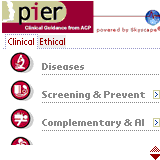Newswire:
| WASHINGTON, April 29 /U.S. Newswire/ -- The Agency for Healthcare Research and Quality today announced a second clinical decision-support tool for personal digital assistants (PDAs) that is designed to help clinicians deliver evidence-based medicine when they are with a patient.
AHRQ's new Interactive Tool, the Preventive Services Selector, an application for Palm Pilots and other PDAs, is designed to help clinicians quickly and easily search for which preventive services to provide-or not provide-to patients based on their age and gender. The tool is available for download from the AHRQ Web site at http://pda.ahrq.gov/. "This new tool puts the latest information about prevention into the hands of doctors, who can put it to use immediately by recommending the appropriate preventive services for each individual patient," said Health and Human Services Secretary Tommy G. Thompson. "It's one of the many ways that we're working to tap the power of modern technology to improve the quality of care for all Americans." The interactive preventive services tool is based on the latest recommendations from the U.S. Preventive Services Task Force. The tool will be automatically updated with new Task Force recommendations each time the PDA is synchronized. The Task Force, sponsored by AHRQ, is the leading independent panel of experts in prevention and primary care. The Task Force conducts rigorous, impartial assessments of all of the scientific evidence for a broad range of preventive services, and its recommendations are considered the gold standard for clinical prevention. AHRQ PDA applications are available for download at http://pda.ahrq.gov/. The AHRQ Preventive Services Selector is available in Palm OS, Pocket PC and HTML formats. Additional AHRQ PDA applications are under development. "The Preventive Services Selector, along with AHRQ's recently announced Pneumonia Severity Index Calculator tool, is a good example of how technology can support and improve the delivery of evidence-based health care services," said AHRQ Director Carolyn M. Clancy, M.D. "AHRQ is continuing to find ways to combine state- of-the-science research with technology to create tools that clinicians can use every day." For more information, see the Guide to Clinical Preventive Services, Third Edition, online at http://www.ahrq.gov/clinic/gcpspu.htm. For more information on the U.S. Preventive Services Task Force, visit the AHRQ Web site at: http://www.ahrq.gov/clinic/uspstfix.htm. |
 Description: This is a simple predictive program that can be used to detect those patients that are very critical that need to be in the ICU. This program can also help determine which patients can be safely treated as an outpatient if the computed risk of complication is low enough. This program is based on 2 studies from which a prognostic model was developed to accurately identify critical patients with Community Acquired Pneumonia.
Description: This is a simple predictive program that can be used to detect those patients that are very critical that need to be in the ICU. This program can also help determine which patients can be safely treated as an outpatient if the computed risk of complication is low enough. This program is based on 2 studies from which a prognostic model was developed to accurately identify critical patients with Community Acquired Pneumonia. This is a simple calculator to determine the extent of lung damage present in your patients that have ARDS and that are on the ventilator. It is quite simple to use and the extent of damage to their lungs is easily stratified into a None, Mild, Moderate, or Severe probability of lung injury. Simply select from the drop-down menus and hit Lung Injury Score to calculate the extent of injury. Those who chose to register will obtain FREE lifetime updates and bug fixes.
This is a simple calculator to determine the extent of lung damage present in your patients that have ARDS and that are on the ventilator. It is quite simple to use and the extent of damage to their lungs is easily stratified into a None, Mild, Moderate, or Severe probability of lung injury. Simply select from the drop-down menus and hit Lung Injury Score to calculate the extent of injury. Those who chose to register will obtain FREE lifetime updates and bug fixes.
 Drug recommendations and analysis you can trust, available at the point-of-care.
Drug recommendations and analysis you can trust, available at the point-of-care.






 The makers of
The makers of 



